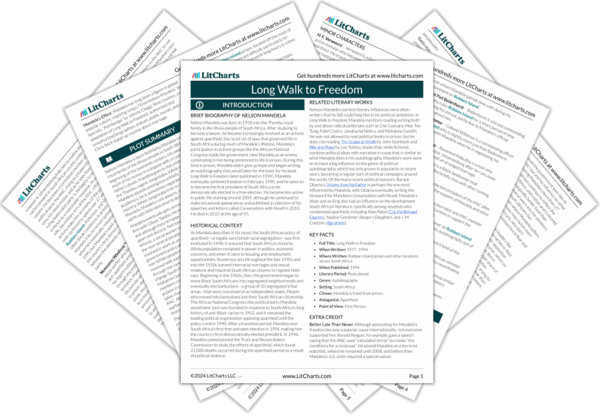Nomzamo Winifred “Winnie” Madikizela Quotes in Long Walk to Freedom
Her name was Nomzamo Winifred Madikizela, but she was known as Winnie. She had recently completed her studies at the Jan Hofmeyr School of Social Work in Johannesburg and was working as the first black female social worker at Baragwanath Hospital. At the time I paid little attention to her background or legal problem, for something in me was deeply stirred by her presence. I was thinking more of how I could ask her out than how our firm would handle her case. I cannot say for certain if there is such a thing as love at first sight, but I do know that the moment I first glimpsed Winnie Nomzamo, I knew that I wanted to have her as my wife.
I entered the court that Monday morning wearing a traditional Xhosa leopard-skin kaross instead of a suit and tie. The crowd of supporters rose as one and with raised, clenched fists shouted “Amandla!” and “Ngawethu!” The kaross electrified the spectators, many of whom were friends and family, some of whom had come all the way from the Transkei. Winnie also wore a traditional beaded headdress and an ankle-length Xhosa skirt.
I had chosen traditional dress to emphasize the symbolism that I was a black African walking into a white man’s court. I was literally carrying on my back the history, culture, and heritage of my people.
De Klerk again excused himself and left the room. After ten minutes he returned with a compromise: yes, I could be released at Victor Verster, but, no, the release could not be postponed. The government had already informed the foreign press that I was to be set free tomorrow and felt they could not renege on that statement. I felt I could not argue with that. In the end, we agreed on the compromise, and Mr. de Klerk poured a tumbler of whisky for each of us to drink in celebration. I raised the glass in a toast, but only pretended to drink; such spirits are too strong for me.

Nomzamo Winifred “Winnie” Madikizela Quotes in Long Walk to Freedom
Her name was Nomzamo Winifred Madikizela, but she was known as Winnie. She had recently completed her studies at the Jan Hofmeyr School of Social Work in Johannesburg and was working as the first black female social worker at Baragwanath Hospital. At the time I paid little attention to her background or legal problem, for something in me was deeply stirred by her presence. I was thinking more of how I could ask her out than how our firm would handle her case. I cannot say for certain if there is such a thing as love at first sight, but I do know that the moment I first glimpsed Winnie Nomzamo, I knew that I wanted to have her as my wife.
I entered the court that Monday morning wearing a traditional Xhosa leopard-skin kaross instead of a suit and tie. The crowd of supporters rose as one and with raised, clenched fists shouted “Amandla!” and “Ngawethu!” The kaross electrified the spectators, many of whom were friends and family, some of whom had come all the way from the Transkei. Winnie also wore a traditional beaded headdress and an ankle-length Xhosa skirt.
I had chosen traditional dress to emphasize the symbolism that I was a black African walking into a white man’s court. I was literally carrying on my back the history, culture, and heritage of my people.
De Klerk again excused himself and left the room. After ten minutes he returned with a compromise: yes, I could be released at Victor Verster, but, no, the release could not be postponed. The government had already informed the foreign press that I was to be set free tomorrow and felt they could not renege on that statement. I felt I could not argue with that. In the end, we agreed on the compromise, and Mr. de Klerk poured a tumbler of whisky for each of us to drink in celebration. I raised the glass in a toast, but only pretended to drink; such spirits are too strong for me.











